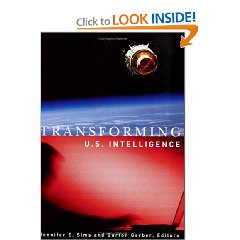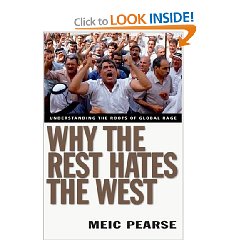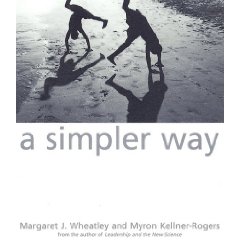Some of the best contributions are those of Jennifer Sims, and the deeper that I read into the works of others, the more I wished that she had had the time to make the entire book her own, casting a broader net for iconoclastic thinkers, foreign intelligence practitioners, non-governmental experts in open source intelligence, religious and labor experts on foreign threats from foreign religions, whose thoughts do not appear in this book.
The book's major premise is that it was not the institutions that failed, but rather leadership–that all that is needed is a change in priorities, perspective, and methods. This is typical of books written by those who, by their own admission, were “part of the problem.”
The section on new requirements is more than adequate if one wishes to continue to focus on unilateral secret intelligence about major state threats but fails to acknowledge that we earned a D, at best, on everything else, to include terrorism, proliferation, environmental scarcity, ethnic conflict, and dictatorial corruption (our friends) as a long-term threat to our vision of participatory democracy and moral capitalism. The requirements section suffers from a rather staid focus on states and “actor” threats, with little mention of history, geography, culture, religion, or demographics, all forces vastly more potent than your average failed state or single transnational group.
The middle third of the book, on capabilities, is the strongest part of the book. It opens with a chapter on open sources by Amy Sands that I would say is now the best available short summary of that discipline's potential. I especially applaud the focus on the need for analysts (who are NOT under cover) to have professional networks that transcend borders and cultures, and to be comfortable with local as well as global information. Where this important chapter falls short, however, is in failing to recognize that 90% of what we need to know from open sources will never be shared with U.S. “intelligence” and we therefore need an Open Source Agency under diplomatic sponsorship; and that we will never unilaterally collect and process all that we need to know, hence we need a global network of regional information-sharing centers, initially doing open sources, eventually doing all sources. These latter two ideas are transformative, the chapter itself, while very solid, is not.
Clandestine intelligence is well covered from a traditional perspective, but stops short by contenting itself with asking for more authority, tighter lanes in the road, and “staying the course.” It does have gems of insight on both possibilities and obstacles, and is a good read. It does not, however, make the transformative leap toward a much larger non-official cover cadre hired at mid-career; toward regional multinational clandestine stations with mature officers on rotation from other nations; toward a much larger career principal agent network; and toward the excellent idea of one recently retired ADDO, that of one-time “it's just business” contracts for specific operations.
Digital dimension is very fine but could have benefited from a much stronger appreciation of what can be done in addressing the contributions that can be made now by man-machine translation networks with automated online dictionaries, and advanced geospatially-based analytics including predictive analysis.
I have no quarrel with the substance of either the analysis or denial sections, other than to observe that they completely eschew multinational, multiagency analysis.
The management section is strong in terms of understanding what insiders think the problems and solutions are, but for one who has read most books in this field, it is so deeply tied to the past and to past biases and perceptions as to forego any claim to being transformative.
The section on homeland defense is well-meaning, but incorrect in its assertion that the FBI has done well with a good model for joint terrorism task forces (JTTF). First off, the FBI remains a completely dysfunctional organization when it comes to either counterintelligence or sharing with state and local organizations. Secondly, as more than one expert has noted, it is the height of ignorance, especially in the aftermath of Hurricane KATRINA and the imminent bird-flu pandemic, to obsess on terrorism as the sole area where national to state and local sharing will take place. 50% of the “dots” that will help prevent the next 9/11 are bottom up dots observed by citizens and cops on the beat, and those dots have no place to go. We need 50 state intelligence centers and networks.
Britt Snider is unique in America-one of two people, the other being Loch Johnson-who have served on both the Church Committee staff and the Aspin-Brown Commission staff. He is one of America's foremost observers of national intelligence, and his chapter on Congressional oversight is one of the best pieces in the book. Having said that, I would note that it lacks two transformative thoughts, both being explored at this time: first, the time has come for every Congressional committee to have its own Sub-Committee on Intelligence and Information Operations (I2O), and for the ranking members of those sub-committees to form a new Special Committee on I2O with concurrent jurisdiction over both secret and open source information expenditures and capabilities across the entire U.S. Government; secondly, and enabled by this new committee, it is time for a new form of hybrid agency, an Open Source Agency that integrates the Library of Congress and is equally responsive to Congress, the Governors, and the Executive as well as the public, with its Director appointed for life, as are Supreme Court justices, and a fixed percentage of the disposable budget (1%) for complete independence from the White House.
“Must read,” but not transformative.









